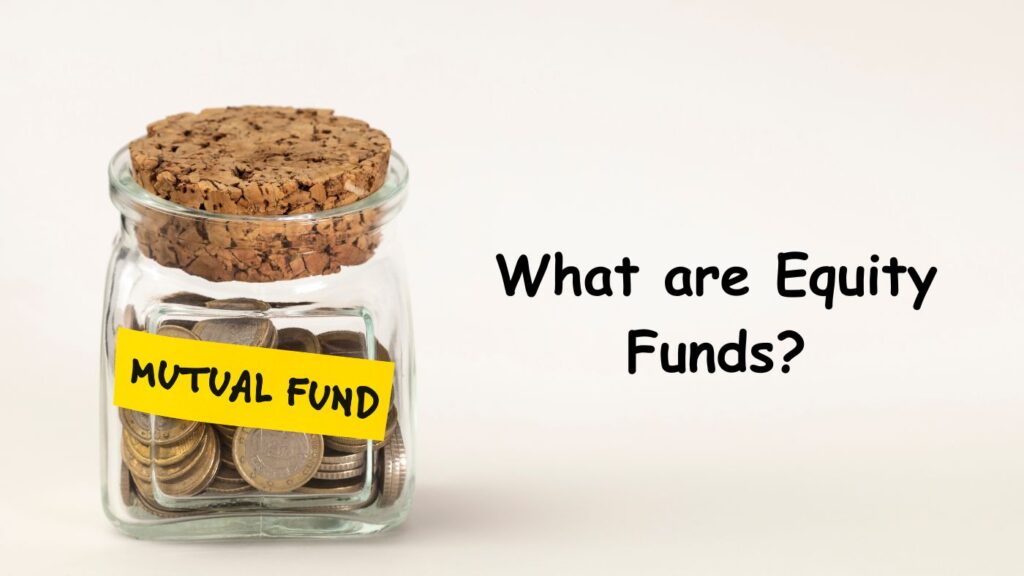Are you new to investing and curious about Equity Funds? Don’t worry; we’ve got you covered. This beginner’s guide will briefly summarise everything you need about Equity Funds.
What are Equity Funds?
Equity Funds are a popular type of Mutual Fund Scheme that invests primarily in shares or stocks of companies. These funds target to achieve long-term capital appreciation by investing in businesses with strong potential for growth.
Investing in Equity Funds can be risky due to the nature of the stock market. However, they also have the potential to yield high returns, making them a tempting option for investors who are willing to take more risks in exchange for potentially higher rewards in the long term.

Types of Equity Funds
- ELSS Fund – Tax Saving Mutual Funds: Investing in ELSS funds can help you avail of tax benefits per Section 80C of the Income Tax Act. They invest mainly in equity-related instruments.
- Large Cap Funds: These funds predominantly invest in large-cap stocks, offering stability and steady returns.
- Large & Mid Cap Fund: These funds balance stability with growth potential by combining large and mid-cap stocks.
- Mid-Cap Fund: Mid-cap funds focus on mid-sized companies, offering higher growth potential but with increased risk.
- Small Cap Mutual Funds: These funds invest in small-cap stocks, providing high growth potential but with higher volatility.
- Multi-Cap Fund: Multi-cap funds invest across large, mid, and small-cap stocks, providing diversification across market capitalisation.
- Flexi-Cap Mutual Funds: Flexi-cap funds can invest across market capitalisations based on market conditions.
- Focused Fund: Focused funds concentrate their investments on a limited number of stocks, aiming for higher returns.
- Contra Fund: Contra funds invest in stocks currently out of favour in the market, expecting them to bounce back.
- Dividend Yield Fund: These funds primarily invest in dividend-paying stocks to provide a regular income stream.
- Value Fund: Value funds follow a value investing approach, focusing on undervalued stocks with growth potential.
- Sectoral Mutual Funds: Sectoral funds invest in specific sectors such as banking, IT, or pharma, offering sector-specific exposure.
- Thematic Funds: Thematic funds invest based on specific themes such as consumption, infrastructure, or sustainability.
- Index Funds: Index funds target replicating the particular market index performance, for instance, the Nifty or Sensex.
- ETFs (Exchange-Traded Funds): Index funds and ETFs are alike, but ETFs can be traded on stock exchanges like individual stocks.
Equity Funds: Active vs. Passive Management
Equity Funds can be categorised into two main types based on how they are managed: Active and Passive.
Active Funds: A fund manager in an Active Fund is responsible for actively selecting and managing the portfolio of stocks. They conduct market research, analyse company performance, and make decisions to maximise returns.
Passive Funds: Passive investment strategy is followed by Passive Funds. Rather than attempting to outperform the market, these funds target to replicate the performance of a particular market index, such as the Sensex or Nifty 50. They do this by holding a portfolio of stocks that mirrors the composition of the chosen index.
Equity Funds: Types Based on Market Capitalisation
Equity funds can be categorised based on the size of the companies they invest in, which is determined by their market capitalisation. Market capitalisation is calculated by multiplying the company’s total outstanding shares by its market price per share. This categorisation helps investors to distinguish between companies of different sizes and invest accordingly.
Large Cap Funds: These funds invest in well-established companies with large market capitalisations. They are considered relatively safer investments compared to mid and small-cap funds.
Mid-Cap Funds: Mid-Cap Funds focus on investing in companies with medium-sized market capitalisations. Companies that fall under this category experience a phase of expansion and have the possibility of generating significant profits.
Small or Micro Cap Funds: Small or Micro Cap Funds target companies with small market capitalisations. Although these funds involve greater risk, they also have the potential to achieve substantial growth.
Equity Funds: Diversified vs. Sectoral/Thematic Funds
Based on their investment strategy, Equity Funds can be further categorised.
Diversified Funds: Diversified Funds invest across a broad spectrum of stocks from different sectors and industries. They offer diversification benefits and suit investors looking for a balanced portfolio.
Sectoral/Thematic Funds: Sectoral or Thematic Funds focus on specific sectors or themes, such as Information Technology, Pharmaceuticals, or Infrastructure. These funds may offer higher returns if the industry chosen or theme performs well but also carry higher risk due to a concentration risk.
Final Words
Investors often choose to invest in Equity Funds, which present an opportunity to participate in the potential growth of the stock market while minimising individual stock risk through diversification. These funds primarily invest in stocks of publicly traded companies. Investing in a diversified portfolio of stocks allows investors to spread their risk and reduce the impact of any one stock’s poor performance on their overall portfolio.
Understanding the basics of Equity Funds and the various options available allows you to make informed investment decisions and embark on your journey towards financial prosperity.
